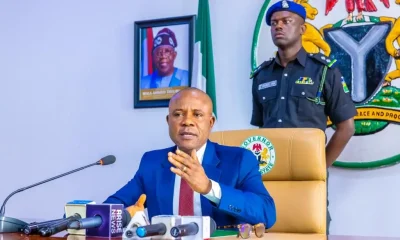Nigeria News
Japa Syndrome: ‘Revamp The Health Sector To Retain Talent’ – UK-Based Nigerian Doctor Urges FG

A UK-based Nigerian doctor, Ugochukwu, has expressed concern over Nigeria’s “brain drain”, emphasizing the urgent need for the Nigerian government to revamp the healthcare sector.
During an interview with Naija News, the healthcare practitioner who works with the University Hospitals Bristol and Weston NHS Foundation Trust, Grange Road, Uphill Road South, Weston-Super-Mare, North Somerset, United Kingdom, explained that inadequate medical resources, poor government policies, and insecurity are driving many skilled professionals abroad.
To retain medical talent, Ugochukwu recommended improving living and working conditions for healthcare practitioners, addressing security concerns, and reducing reliance on medical tourism.
He also highlighted the significant negative impact of the “Japa Syndrome” on Nigeria’s healthcare system, including increased costs, overworked doctors, and declining quality of care.
Good afternoon, Doctor. Could you please introduce yourself?
Doctor: “Thank you for this opportunity. My name is Ugochukwu, and I am a healthcare practitioner with the National Health Service (NHS) in England, United Kingdom. I specialize in emergency medicine.”
As a Nigerian doctor practicing in the UK, what are your thoughts on the “brain drain” from Nigeria?
Doctor: “First, let’s define what we mean by “brain drain.” It refers to a situation where a large number of educated or professional individuals leave their home country or profession for better opportunities elsewhere, such as higher pay or improved living conditions.
“As a Nigerian doctor in the UK, I find the current state of the Nigerian healthcare sector deeply troubling. Nigeria is losing some of its brightest minds and most skilled professionals, who are leaving the country due to the challenging circumstances they face. These individuals, who have invested in their education and skills, are migrating to places where they feel their expertise is more valued and where their contributions are better appreciated.
“It’s disheartening because, ideally, no one would want to leave their home country if the living conditions were favorable. People typically only move abroad for better opportunities or to explore new experiences. However, in Nigeria, the situation is reversed. Several factors contribute to this, including inadequate medical equipment, insufficient manpower, poor government policies, corruption, favoritism, and the widespread insecurity in the country.
“These issues collectively drive Nigerian doctors and other professionals to seek better opportunities abroad. I’ll pause here to allow for further discussion. Thank you again for this opportunity to share my thoughts.”
How do you think Nigeria can retain its medical talent?
Doctor: “Retaining medical talent in Nigeria requires implementing policies that significantly improve the living and working conditions for healthcare professionals. One crucial step is replicating the amenities and equipment that we, as healthcare practitioners in the UK, have access to. The lack of these resources in Nigeria hampers our ability to deliver quality care.
“There’s also a need to change the negative perception of doctors, where their challenges are often misunderstood or ignored. In the UK, for example, if a healthcare professional makes a mistake, they are held accountable, which drives a continuous improvement in the quality of care. This is part of what we call “service improvement,” where healthcare providers are expected to demonstrate yearly advancements in their practice.
“For Nigeria to retain its talent, the government must implement policies that enhance the healthcare sector. This includes reducing reliance on medical tourism, where even top officials leave the country for medical care instead of investing in the local healthcare system. Resources spent abroad could be better used to improve healthcare facilities within Nigeria.
“Another critical aspect is addressing security concerns. Healthcare professionals need to feel safe and confident that they can provide for their families and plan for their future. When doctors are assured of their safety and well-being, they are more likely to remain in Nigeria and contribute to society.”
What role do you think Nigerian doctors in the diaspora can play in improving healthcare in Nigeria?
Doctor: “Nigerian doctors in the diaspora can contribute to healthcare improvement in several ways. One significant contribution is by giving back through initiatives like free surgical procedures in various parts of Nigeria. In the past, there have been instances where Nigerian doctors abroad organized such efforts, offering free healthcare services to those in need.
“However, recent security concerns have made it challenging for many of us to return to Nigeria to conduct these activities. The fear of violence, especially in areas plagued by insurgency or banditry, has discouraged many from participating in these initiatives. Despite this, we continue to discuss and explore ways to support the healthcare sector from abroad.
“Another way we can contribute is by raising awareness about various health conditions that are often misunderstood or neglected in Nigeria. Through collaborations with the Nigerian government at federal, state, and local levels, we can organize government-funded health projects that benefit the masses.
“Additionally, platforms like this interview provide opportunities to educate the public on prevalent health issues, such as stroke or cellulitis, and how to prevent or manage them. These efforts can make a significant difference in improving healthcare in Nigeria.”
How has the “Japa Syndrome” (the trend of Nigerians seeking opportunities abroad) impacted the Nigerian healthcare system?
Doctor: “The ‘Japa Syndrome’ has had a profound negative impact on Nigeria’s healthcare system. It has exacerbated the challenges faced by the sector, particularly for those who cannot afford private healthcare. With many skilled professionals leaving, government hospitals are often overwhelmed and under-resourced, leaving those without the means for private care in dire straits.
“In the UK, NHS services are free, ensuring that everyone has access to healthcare. In contrast, in Nigeria, the exodus of medical professionals has led to increased costs in both private and public healthcare sectors. This has made it difficult for many Nigerians to afford necessary medical care, leading to delays in seeking treatment and worsening health outcomes.
“Another significant issue is the burnout syndrome among the remaining doctors in Nigeria. With fewer doctors available, those who remain are overworked, leading to stress and reduced quality of care. For instance, the World Health Organization (WHO) recommends a doctor-to-patient ratio of 1:600, but in Nigeria, the ratio is approximately 1:9,000, which is unsustainable and leads to significant strain on the healthcare system.
“The ongoing brain drain is unlikely to slow down unless the government declares a state of emergency in the health sector and takes urgent action to address these issues.”
Have you or any of your colleagues experienced the recent attacks on immigrants in the UK?
Doctor: “Personally, I haven’t experienced any attacks, nor have any of my colleagues that I’m aware of. In my area, such incidents are not common. Most of the reports I’ve heard are from the media, and while there have been some isolated cases, the security situation here is generally robust.
“In the UK, there is a strong security presence, and the government is proactive in addressing these issues. Some agitation is expected, especially with concerns about job competition, but it’s not as severe as sometimes portrayed. My colleagues and I continue to work in a secure environment, and while incidents like property damage have occurred, measures are usually taken to support those affected.”
Have these incidents influenced your decision to stay in the UK or consider returning to Nigeria?
Doctor: “The thought of returning to Nigeria hasn’t crossed my mind, especially since I only recently left the country. The situation in Nigeria is still very fresh in my memory, and I am acutely aware of the challenges that led me to leave in the first place.
“Even in the future, I don’t see returning to Nigeria as a viable option unless there is a significant change in the government and its approach to healthcare. If the situation in the UK becomes untenable, I might consider moving to another country, but Nigeria is not currently on my list of options. For now, I plan to stay in the UK, where I feel secure and able to continue my work effectively.”












